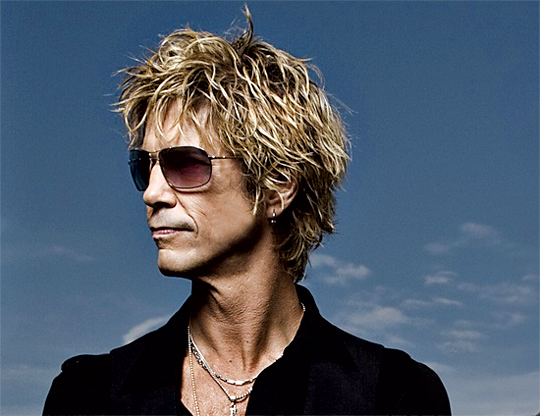Duff McKagan’s column runs every Thursday on Reverb. He writes about what’s circulating through his iPod every Monday.As our flight took us somewhere above Central America, the pilot came on to tell us the United States had just attacked Iraq in something that the Pentagon dubbed “Operation: Desert Storm.” It was January 17, 1991.Before the Internet was common knowledge, and before there was a computer in virtually every home (as there is now), playing rock shows in faraway places like Brazil was an exotic endeavor, to say the least. Flying all the way down there to headline two nights at the Rock in Rio Festival was pretty surreal. We just had no idea if Guns N’ Roses had fans in this part of the world or not.My first trip to many foreign lands came as a result of the growing popularity of my band. For most of the places we first traveled to, however, we had a good idea of our fan base because of the well-tracked record-sales data from each region (yes, artists used to sell records!). In pretty much all of South America, though–back then and to this day–records, CD’s, T-shirts, and whatever else, are all pirated. As a result, and with no MySpace “hits” or Twitter follower counts, we just had no idea how many fans were going to show up to see us.I hate to fly. I have always been claustrophobic. A plane is a metal tube with no way out. I used to self-medicate my condition with whatever was available. And after a long trip like this, the constant to-and-fro and drag and frum, I am exhausted. The plane lands, and thousands of really emotional fans are waiting. I am overwhelmed. They are overjoyed. I feel like a fucking Martian after traveling for so long and feeding my body with mind-numbing intoxicants. I’ve got to get to my hotel so that I can get my head around this whole thing. Funny as it sounds now, Billy Idol was a touchstone for me. Not that he ever knew this, and it wasn’t like we were real close, but I knew him enough and I knew that he was also playing at the RIR. Sometimes even in my own band, I would feel completely alone and alienated. The fact that Billy was down there gave me a sense of solidness somehow. I have never talked about this, and now it seems a little funny and goofy. If I could really paint a picture of what things are like constantly touring and being claustrophobic and being adored and loved and being tugged around and loving back as hard as you can . . . and filling my body with all the bad stuff, the picture that I’d paint would resemble some kind of upside-down stairs manned by a bloated U.S. Customs agent. With my name in large letters on top his list of people to apprehend. I suffered a gradual-but-steady loss of sanity during about three or four of those early years. Things that are plainly insane to me now were absolutely normal, ho-hum events back then.Back to my point of not knowing if we had fans in Brazil up to that point: Apparently we did . . . and lots of them. The Maracana Stadium in Rio is the biggest stadium in the world, and we were playing two nights there. In the year prior to these gigs, sadly, we had to replace our founding drummer because of acute drug problems. We had to replace him so that we could finally get on with making our new record and touring. Providence was with us at long last when we found Matt Sorum, who had previously been playing with The Cult. Matt is one hell of a drummer, and held the constitution and road fortitude to keep up with the rest of us. These two shows in Rio, 175,000 per night, were Matt’s first as our drummer. Trial by fire . . . on steroids.Those first gigs started what has become a long-running love affair with my chosen place in my chosen profession, and South America as a whole. On that first trip, I came to realize what absolute passion and honesty the average rock fan down there has about music and life on a grander scheme.That first foray down there for me made many lasting memories–both good and bad, I suppose. I grimace sometimes when people make assumptions about how fancy my band was at that point. How we must’ve felt like princes, and that everything had to have been handed to us carte blanche. For me, it’s a story of “you always want what you don’t have.” That is to say, at that time there were friends of mine who I would have switched places with. Friends whose life seemed normal and on-track while mine seemed to be spiraling out of control: the choking pressure on my chest, and the charcoal-black and sickened stomach. The funny thing is: Having lived through all of it and learned all my hard-won lessons, life for me, like anyone else, is indeed what you make of it. My dizziness and claustrophobic moments are still with me. But they no longer own me.
More Stories From This Author
Capitol Hill Block Party Artist Panel Series 2019
The Capitol Hill Block Party Artist Panel Series 2019 is free (no festival wristband required), all-ages, and takes place from…
By
Seattle Weekly • July 9, 2019 11:10 am
Golden Idols will release new EP
Seattle quartet returns with ‘Uneasy’
By
Seattle Weekly • June 24, 2019 5:30 pm
Travis Thompson, Wolf Parade headline Fisherman’s Village fest
The Everett Music Initiative festival, May 16-18 in Everett, will showcase more than 50 acts.
By
Evan Thompson • March 18, 2019 12:00 pm






